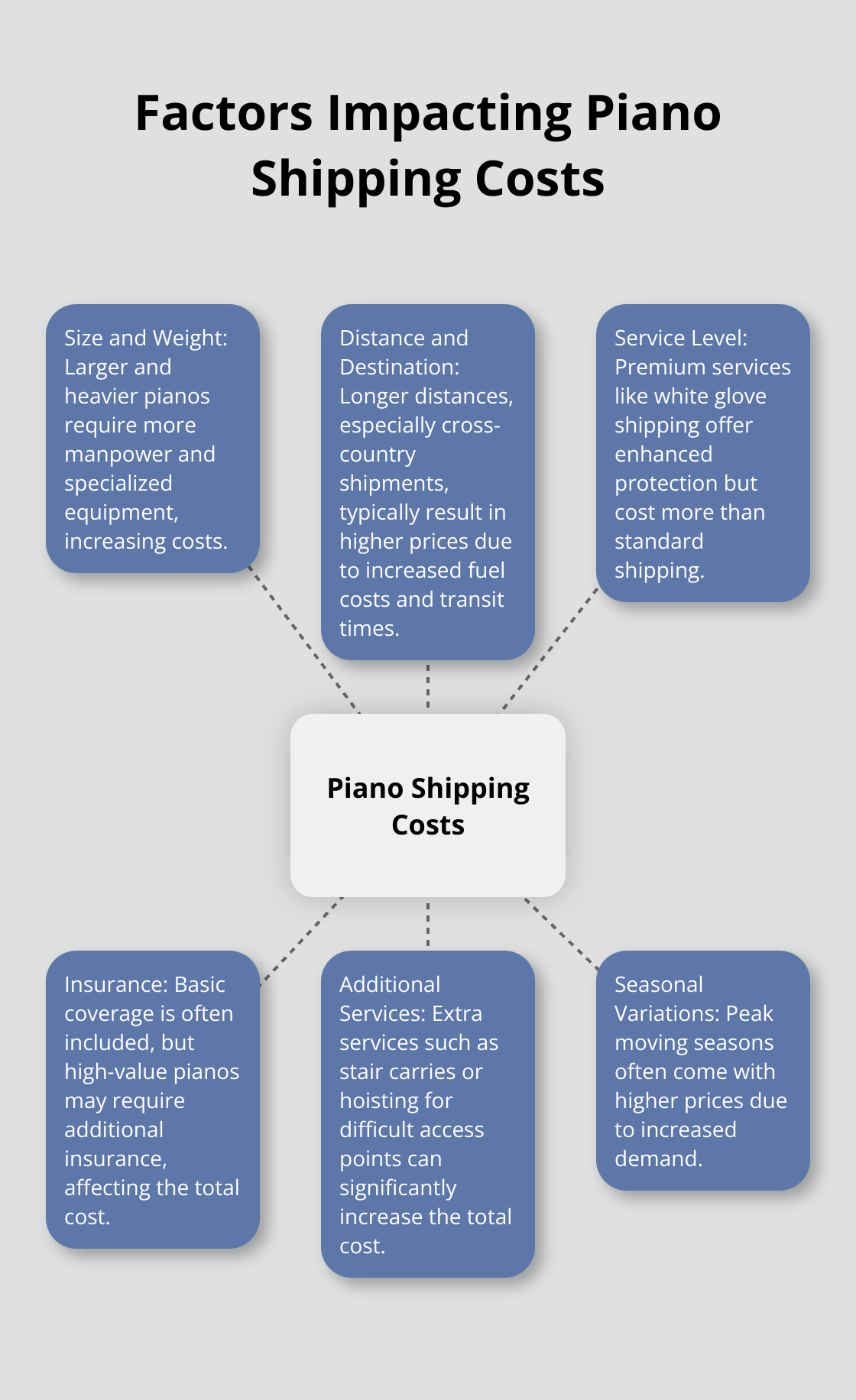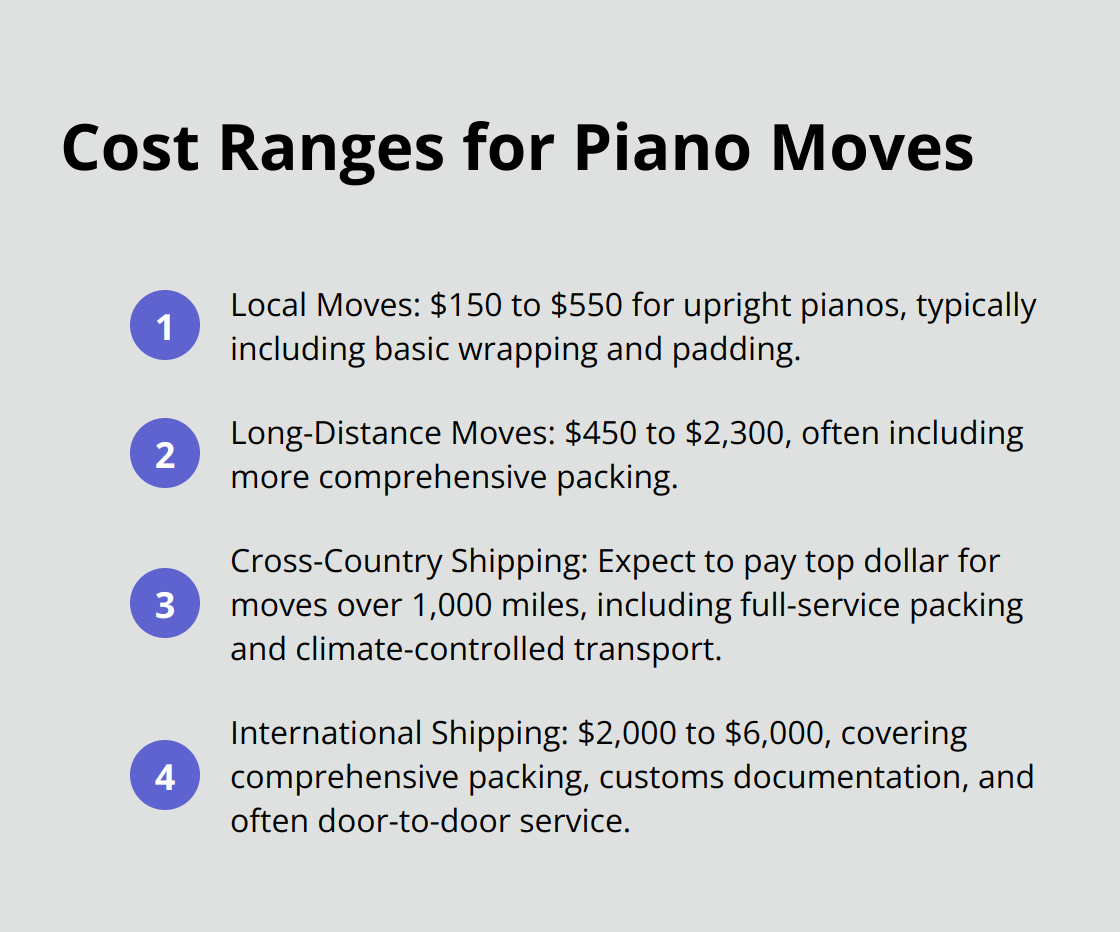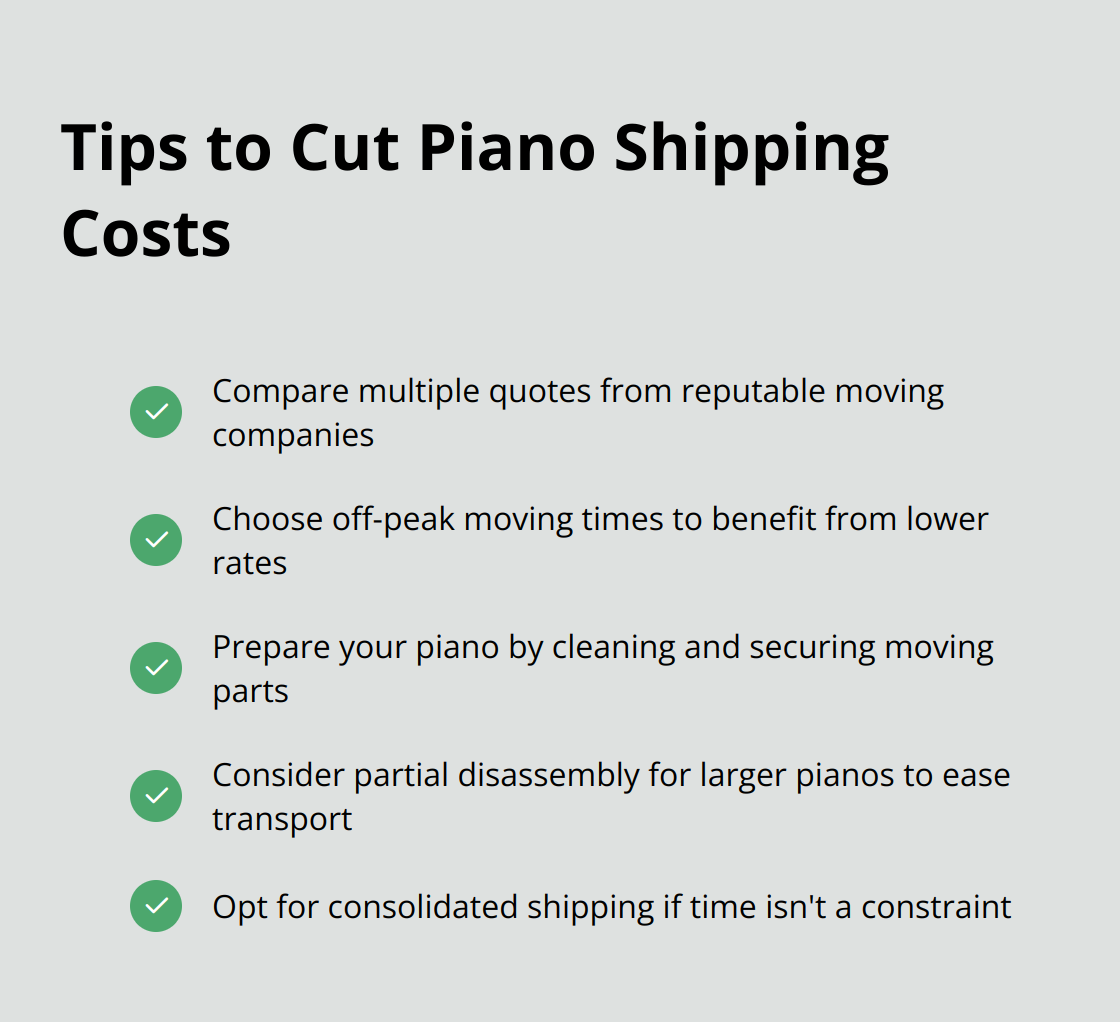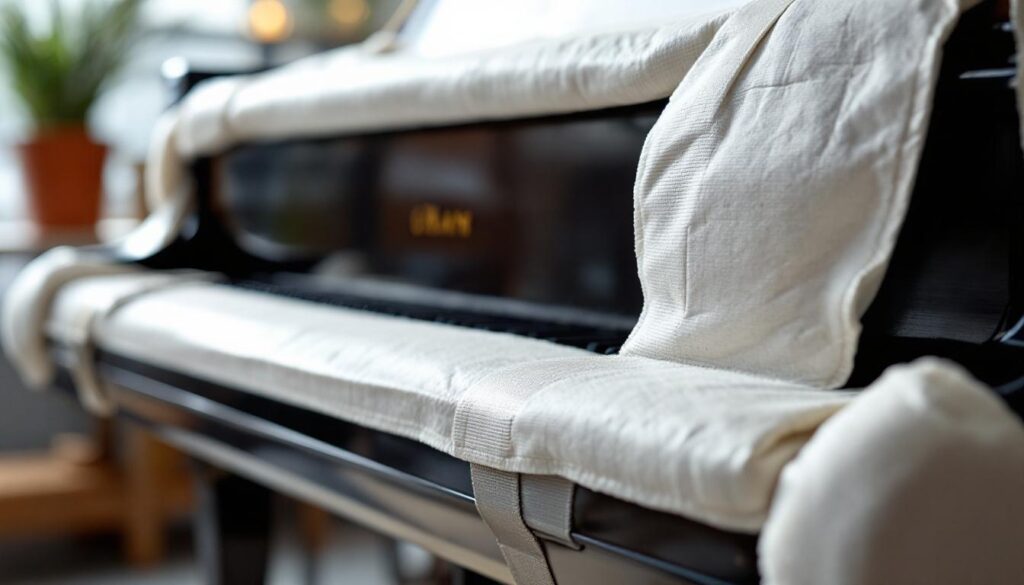Shipping a piano can be a complex and costly endeavor. At Southbay Moving Systems, we understand the intricacies involved in transporting these delicate instruments.
The shipping piano cost depends on various factors, including size, distance, and the level of service required. In this post, we’ll break down these elements and provide practical tips to help you navigate the process efficiently.
What Impacts Piano Shipping Costs?
At Southbay Moving Systems, we understand the complexities of piano transportation. Several key factors influence the final price when shipping these intricate instruments.

Size and Weight Considerations
The piano’s size, type, and weight affect shipping costs, as does the distance the instrument must travel. For example, lightweight upright pianos typically cost less to move than heavier grand pianos. Larger and heavier pianos require more manpower and specialized equipment, which increases the overall cost.
Distance and Destination Impact
The length of your move plays a major role in determining the price. Local moves (within 100 miles) usually cost less than long-distance moves. Cross-country shipments often have higher prices due to increased fuel costs and longer transit times.
Service Level Options
Your choice of shipping service affects the price. Standard shipping costs less but provides minimal protection. White glove service includes careful wrapping, climate-controlled transport, and professional setup at the destination. This premium service costs more but offers enhanced protection for valuable instruments.
Insurance and Additional Services
Insurance is an important consideration when calculating costs. Basic coverage often comes included, but high-value pianos may require additional insurance. Extra services can significantly increase the total cost:
- Stair carries
- Hoisting (for difficult access points)
Seasonal Variations
Weather conditions can significantly affect the safety and condition of your piano during a move. The time of year can impact both the cost and safety of your piano move. Peak moving seasons often come with higher prices due to increased demand. You can potentially save money by scheduling your piano move during off-peak seasons.
These factors combine to determine the final cost of shipping your piano. Understanding them helps you make informed decisions and plan your budget effectively. As we move forward, let’s explore the average cost ranges for different types of piano moves.
How Much Does Piano Shipping Cost?
At Southbay Moving Systems, we’ve handled numerous piano moves throughout our three decades in business. We’ve observed firsthand how costs can fluctuate based on various factors. Let’s examine the typical price ranges you might encounter when shipping a piano.

Local Moves: The Budget-Friendly Choice
For local moves, piano moving costs typically range from $150 to $550. This range usually applies to upright pianos, which can cost between $100 to $350 to move locally. These prices often include basic wrapping and padding but may exclude additional services (such as stair carries or hoisting).
Long-Distance Moves: A Substantial Investment
When you move your piano long distance, costs increase significantly. Long-distance piano moving can range from $450 to $2300. These prices often include more comprehensive packing and may cover some additional services, but it’s essential to clarify what’s included with your mover.
Cross-Country Shipping: The Premium Option
For moves over 1,000 miles, expect to pay top dollar. These prices typically include full-service packing, climate-controlled transport, and often setup at the destination.
International Shipping: A Complex Undertaking
International piano shipping represents the most complex and expensive option. Moving your piano internationally typically ranges from $2,000 to $6,000, depending on factors such as the type of piano and shipping method. This price usually covers comprehensive packing, customs documentation, and often door-to-door service. However, you may need to pay additional fees for customs duties and taxes upon arrival.
It’s crucial to note that these are average ranges. Your specific cost could be higher or lower depending on factors like the piano’s value, any obstacles at pickup or delivery locations, and the level of service you choose. Always request detailed quotes from reputable movers to ensure you’re comparing similar services when making your decision.
Now that we’ve explored the cost ranges for different types of piano moves, let’s look at some practical ways to reduce these expenses without compromising on the safety of your instrument.
How to Cut Piano Shipping Costs
At Southbay Moving Systems, we’ve discovered several strategies to help our customers reduce piano shipping costs without compromising safety. Here are some practical tips to lower your expenses:

Compare Multiple Quotes
Don’t accept the first quote you receive. Contact at least three reputable moving companies and request detailed, itemized quotes. This approach allows you to compare prices and services accurately. Be cautious of quotes that seem unusually low – they often indicate subpar service. The cheapest option isn’t always the best when it comes to moving valuable instruments like pianos.
Choose Off-Peak Moving Times
Moving during peak seasons (typically summer months and weekends) can significantly increase your costs. If possible, schedule your piano move during off-peak times. Book your move for a Tuesday in February, and you’ll likely pay less than that Saturday in July. Many moving companies offer lower rates during weekdays or in the winter months when demand is lower.
Prepare Your Piano
Proper preparation can save you money and protect your instrument. Clean your piano thoroughly and secure all moving parts. Remove and pack small, detachable items separately. This not only protects your piano but can also speed up the moving process, potentially reducing labor costs. For upright pianos, consider removing the legs and pedals if you’re comfortable doing so – this can make the piano easier to move and might lower your costs.
Consider Partial Disassembly
For larger pianos (especially grand pianos), partial disassembly can significantly reduce shipping costs. This process typically involves removing the legs, lyre (pedal box), and music desk. While this requires expertise, it can make the piano much easier to maneuver and transport, potentially lowering your overall moving costs. However, only attempt this if you have the necessary skills or hire professionals to do it.
Opt for Consolidated Shipping
If you’re not in a rush, consider consolidated shipping options. This method involves your piano being transported with other items, which can reduce costs. While it may take longer, the savings can be substantial.
Final Thoughts
Shipping a piano involves multiple factors that affect the cost. The size, weight, distance, service level, and additional requirements like insurance all influence the final shipping piano cost. You should compare quotes from multiple reputable moving companies and consider not just the price but also the included services. Proper research and planning will help you make informed decisions that balance cost-effectiveness with the safety of your instrument.
Professional expertise makes a significant difference in piano moving. We at Southbay Moving Systems have over three decades of experience in handling pianos and other delicate items. Our team understands the complexities of piano transportation and provides customized solutions to ensure your instrument’s safe arrival at its destination.
For a smooth and stress-free piano moving experience, trust in our expertise at Southbay Moving Systems. We offer comprehensive services, including personalized packing and secure storage options (with transparent pricing). Our team will safeguard your valuable instrument throughout its journey, giving you peace of mind from start to finish.




